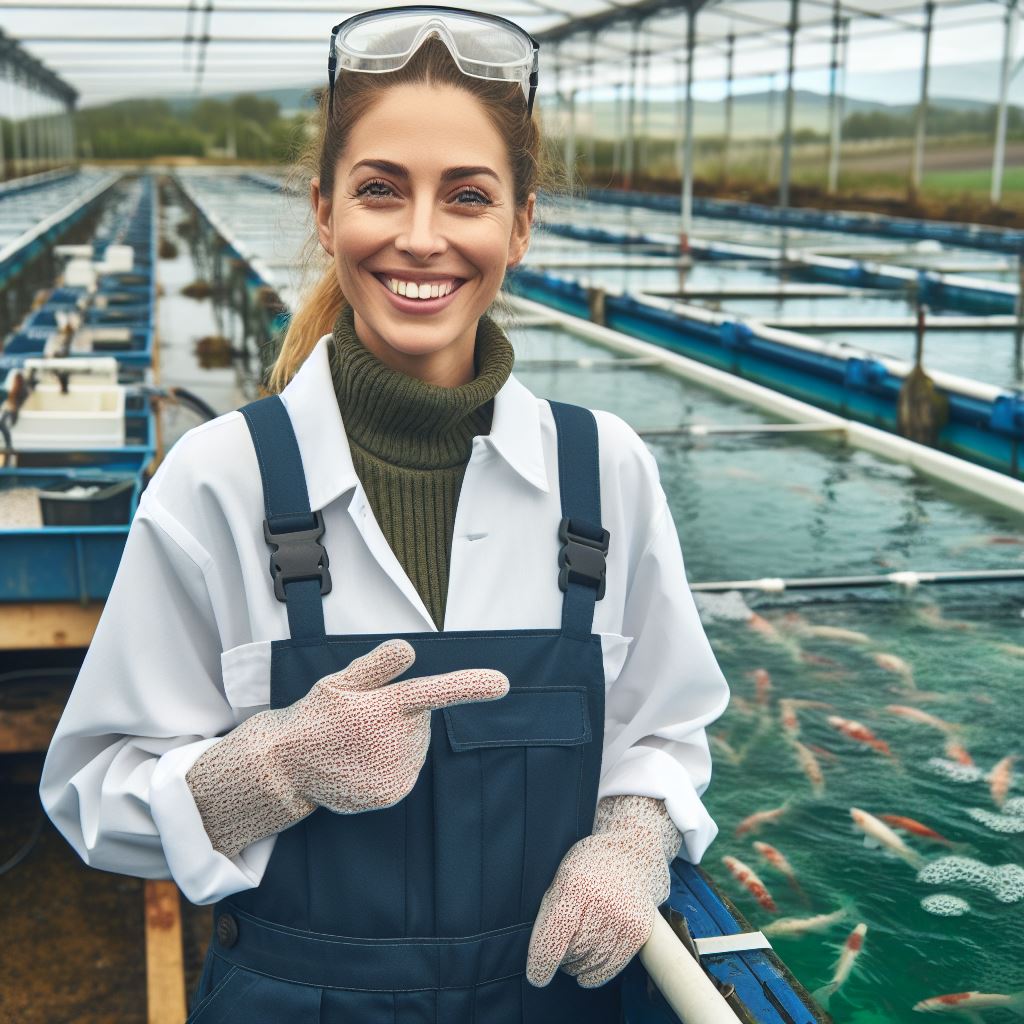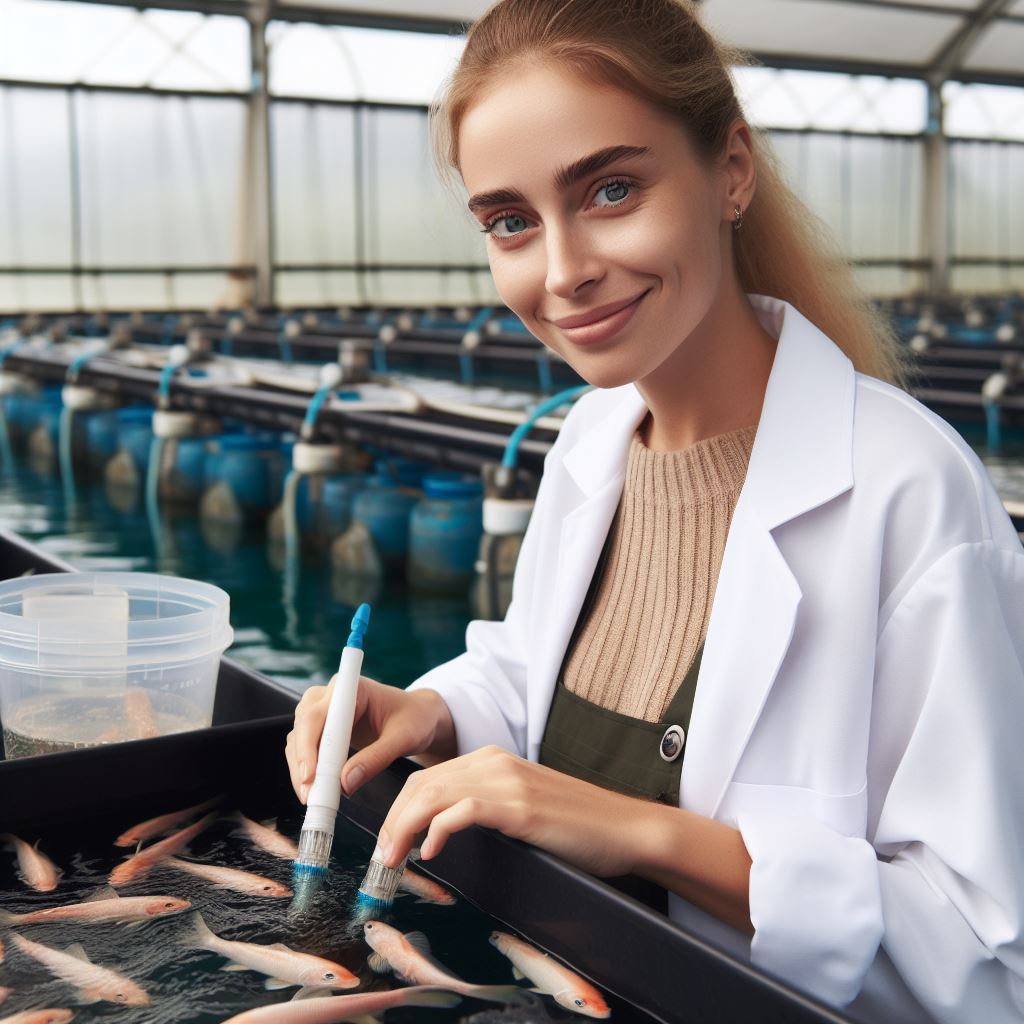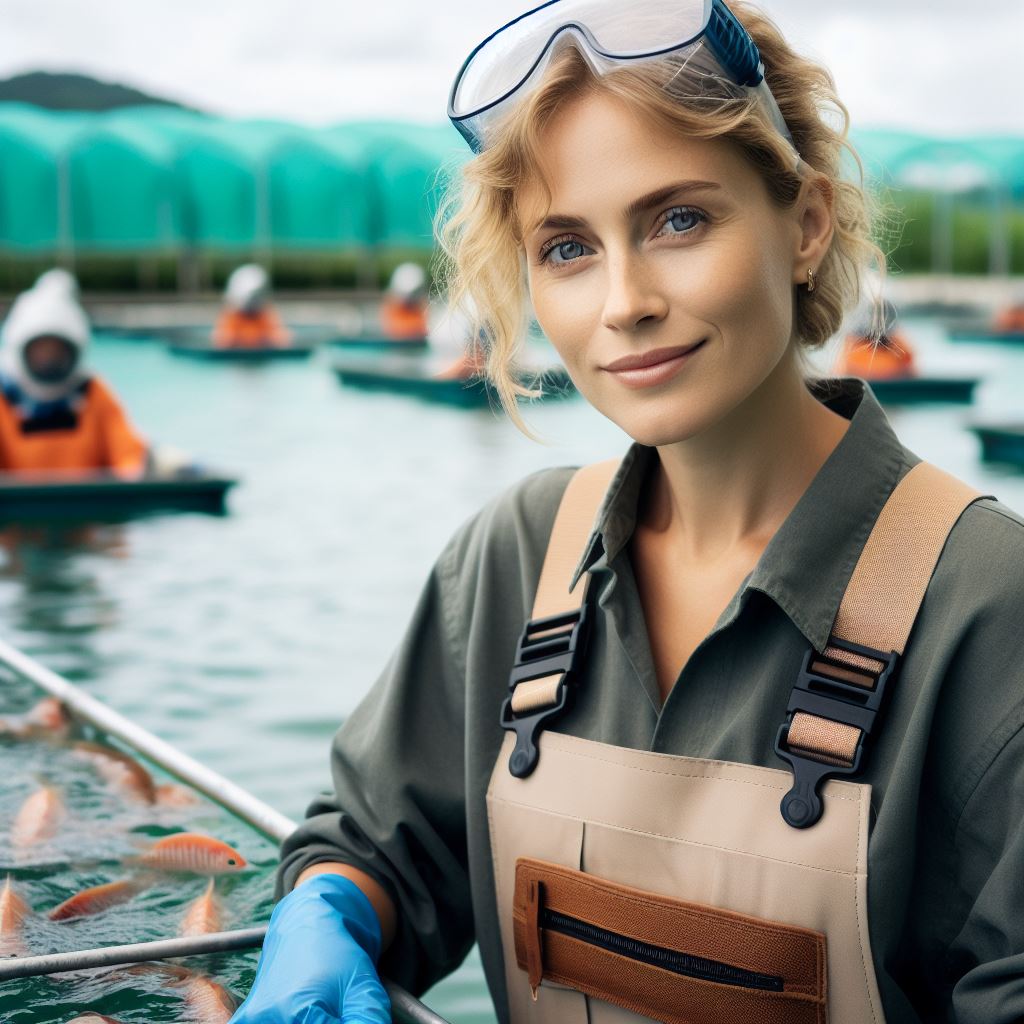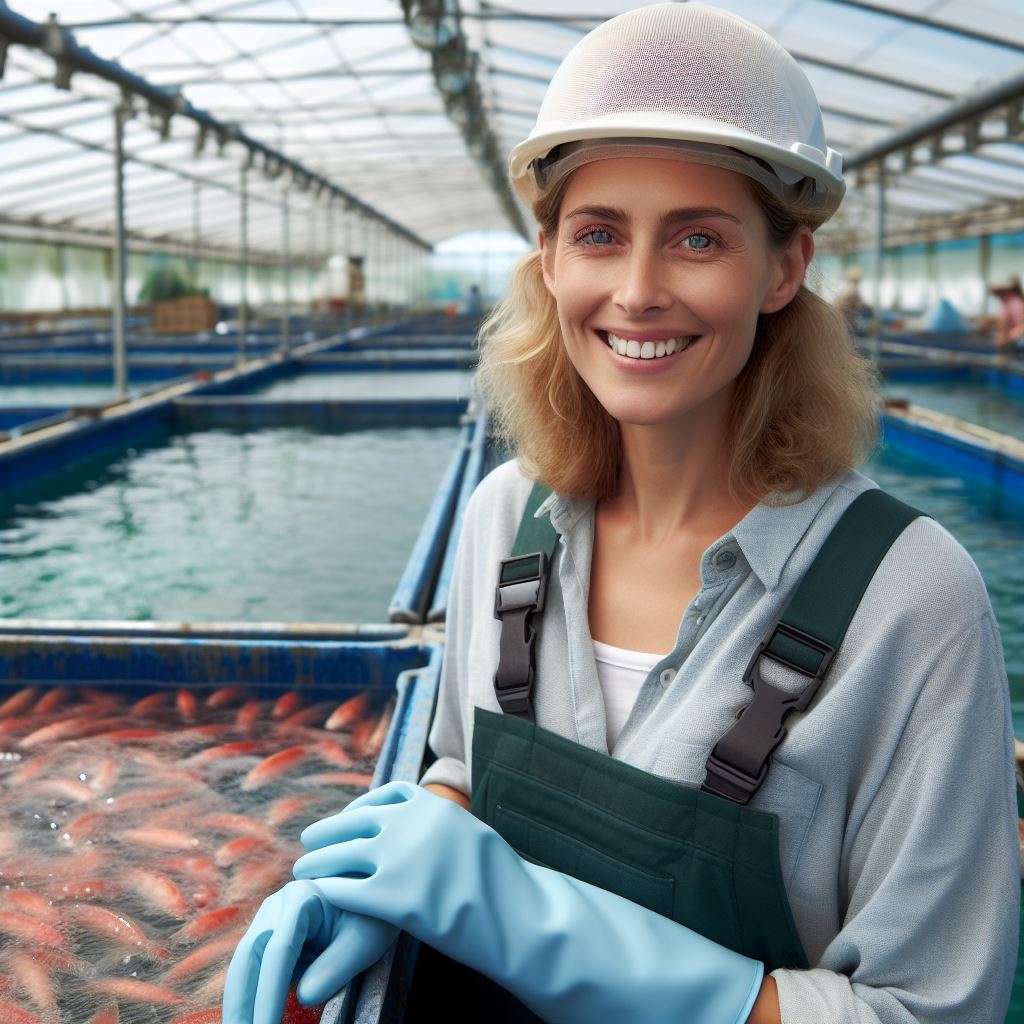Introduction
Overview of Aquaculture in the UK
Aquaculture in the UK refers to the farming and cultivation of aquatic organisms such as fish, shellfish, and aquatic plants.
It involves the rearing, breeding, and harvesting of these organisms in controlled environments like ponds, tanks, and cages.
Importance of Education in Aquaculture
Education plays a crucial role in the development and success of aquaculture in the UK.
It equips individuals with the necessary knowledge and skills to ensure sustainable and responsible aquaculture practices.
Proper education in this field helps in understanding the ecological, economic, and social aspects of aquaculture.
In order to support the growth of the industry, educational pathways are essential.
These pathways provide the necessary training and qualifications needed for individuals to enter and progress in the aquaculture sector.
They also focus on teaching advanced techniques and innovative practices to enhance productivity and minimize environmental impact.
Moreover, education in aquaculture enables individuals to address the challenges and issues faced by the industry.
It promotes research and scientific advancements, leading to the development of new technologies, improved production methods, and efficient resource management.
Creating awareness about the importance and benefits of aquaculture education is crucial in encouraging individuals to pursue careers in this field.
It will not only contribute to the growth of the industry but also help in meeting the increasing demand for sustainable seafood and aquaculture products.
In the next sections of this blog series, we will explore the different education pathways available for those interested in pursuing a career in aquaculture in the UK.
Read: Top 5 Challenges for UK Aquaculture Techs
Types of Aquaculture Education Programs in the UK
In the UK, there are various educational pathways available for individuals interested in pursuing a career in aquaculture.
Personalized UK Career Consulting
Receive tailored career guidance designed just for you. Get actionable steps and expert support to boost your career in 1-3 days. Take control of your career now.
Get StartedThese programs cater to both undergraduate and postgraduate students, as well as those seeking vocational training and apprenticeships.
Undergraduate Degrees in Aquaculture
Undergraduate degrees in Aquaculture offer a comprehensive study of the field, providing students with a strong foundation in the principles and practices of fish farming.
Bachelor of Science in Aquaculture
The Bachelor of Science in Aquaculture equips students with the necessary knowledge and skills to tackle the challenges of sustainable aquaculture production.
Bachelor of Science in Marine Biology with a Focus on Aquaculture
Alternatively, students can opt for a Bachelor of Science in Marine Biology with a focus on Aquaculture.
This degree offers a broader understanding of marine ecosystems and their relationship with aquaculture.
It combines aspects of marine biology with specialized coursework in aquaculture methods and management.
Postgraduate Degrees in Aquaculture
For those looking to further their education, postgraduate degrees in Aquaculture are available.
Master of Science in Aquaculture
A Master of Science in Aquaculture delves deeper into the scientific and technical aspects of the industry.
It equips students with advanced knowledge in areas such as fish reproduction, nutrition, and disease management.
Ph.D. in Aquaculture
The highest level of academic achievement in the field of Aquaculture is a Ph.D. In this program, students conduct original research under the guidance of experienced faculty members.
This allows them to contribute new insights and advancements in the industry.
Vocational Training and Apprenticeships
Apart from traditional academic pathways, vocational training and apprenticeships are also viable options in the UK’s aquaculture sector.
Aquaculture Technician Apprenticeships
Aquaculture Technician Apprenticeships provide hands-on experience and practical training for individuals seeking a career in fish farm management.
This apprenticeship program combines classroom learning with on-the-job training, ensuring a well-rounded skill set.
Your Dream Job Starts with a Perfect CV
Get a tailored CV and cover letter that captures your unique strengths and stands out in your industry. Let us help you make an unforgettable first impression.
Get StartedVocational courses in Aquaculture
Furthermore, vocational courses in Aquaculture offer specialized training for individuals looking to develop specific skills in the field.
These courses focus on practical knowledge and provide students with a solid foundation in aquaculture techniques and practices.
In essence, the UK offers a range of education pathways for individuals interested in pursuing a career in aquaculture.
Whether through undergraduate or postgraduate degrees, or vocational training and apprenticeships, these programs equip students with the necessary knowledge and skills to thrive in the industry.
With the increasing demand for sustainable seafood production, the need for well-trained aquaculture professionals continues to grow.
Universities and Institutions Offering Aquaculture Education in the UK
- Dive into Excellence at the University of Stirling: This institution stands as a beacon for aquaculture enthusiasts, offering cutting-edge programs and research opportunities.
- Nurturing Minds in the Highlands and Islands: Discover the University of the Highlands and Islands, where aquaculture education thrives in a picturesque setting, fostering a unique learning experience.
- Wave of Knowledge at the University of Plymouth: Explore the University of Plymouth’s dynamic aquaculture curriculum, equipping students with hands-on skills and theoretical insights.
- Aberdeen’s Aquaculture Hub: The University of Aberdeen takes pride in its robust aquaculture courses, blending academic rigor with industry relevance for comprehensive learning.
- Unraveling Mysteries with SAMS: SAMS actively explores aquaculture, delving into marine intricacies through research and education, offering a robust platform for in-depth studies.
- Cefas: Bridging Science and Aquaculture: Cefas, a pivotal link, blends scientific expertise with practical aquaculture applications, fostering a holistic learning experience.
Embark on your aquaculture journey through these educational pathways, where knowledge meets innovation.
Read: UK Aquaculture: Salary & Career Outlook 2024
Uncover the Details: Deep-Sea Tales: Interviews with UK Fishermen
Career Opportunities in Aquaculture
Aquaculture Farm Management
- Aquaculture farm managers oversee the daily operations of fish and shellfish farms.
- They are responsible for managing staff, maintaining water quality, and ensuring the health and growth of aquatic species.
- Farm managers also handle financial aspects, such as budgeting, purchasing, and marketing the aquaculture products.
- This role requires strong leadership skills, knowledge of aquaculture practices, and business acumen.
Research and Development
- Research and development (R&D) professionals in aquaculture focus on improving breeding techniques, feed formulas, and production processes.
- They conduct experiments, analyze data, and develop strategies to optimize productivity and sustainability in aquaculture.
- R&D professionals collaborate with scientists, farmers, and industry experts to develop innovative solutions for the aquaculture sector.
- This role requires excellent analytical and problem-solving skills, as well as a strong background in aquaculture science.
Aquaculture Production and Operations
- Aquaculture production and operations professionals oversee the day-to-day activities on fish and shellfish farms.
- They monitor water quality, feed the aquatic species, and ensure optimal conditions for growth and health.
- Production and operations experts also handle equipment maintenance, disease control, and harvesting procedures.
- This role requires a keen attention to detail, physical stamina, and a good understanding of aquaculture practices.
Quality Assurance and Compliance
- Quality assurance and compliance professionals ensure that aquaculture operations meet industry standards and regulations.
- They develop and implement quality control procedures, conduct inspections, and monitor the safety and hygiene practices.
- Compliance specialists also ensure adherence to environmental regulations and maintain appropriate documentation.
- This role requires strong attention to detail, knowledge of regulatory frameworks, and excellent organizational skills.
Marketing and Sales in Aquaculture
- Marketing and sales professionals in aquaculture promote and sell seafood products to retailers, wholesalers, and consumers.
- They develop marketing strategies, analyze market trends, and build relationships with buyers.
- These professionals also educate consumers about the benefits of aquaculture and its sustainable practices.
- This role requires strong communication and negotiation skills, as well as a good understanding of consumer preferences.
Aquaculture Consultancy
- Aquaculture consultants provide expert advice and support to aquaculture businesses and organizations.
- They assess existing practices, identify challenges, and recommend solutions to improve productivity and profitability.
- Consultants also assist in the development of business plans, feasibility studies, and risk management strategies.
- This role requires extensive knowledge of aquaculture, excellent problem-solving skills, and the ability to work independently.
Lastly, the field of aquaculture offers a wide range of career opportunities for individuals interested in the sustainable production of fish and shellfish.
Whether it’s managing farms, conducting research, ensuring quality control, or marketing aquaculture products, there are various pathways to pursue in this growing industry.
By choosing a career in aquaculture, individuals can contribute to global food security and environmental sustainability while also enjoying fulfilling and dynamic work experiences.
Read: Day in the Life of a UK Aquaculture Technician

Other Skills and Training for Aquaculture Professionals
Aquaculture professionals not only need a strong educational background in the field, but they also require a range of other skills and training to excel in their careers.
This blog section explores the various additional skills and expertise that aquaculture professionals should possess.
Optimize Your LinkedIn for Success
Boost your LinkedIn profile with a professional bio, keyword-rich headline, and strategic recommendations that attract recruiters. Stand out from the crowd and get noticed.
Optimize NowTechnical Skills and Expertise
- Aquaculture professionals should have a solid foundation in technical skills such as water quality management and fish health assessment.
- They must be proficient in handling aquatic species, breeding techniques, and knowledge of fish nutrition.
- Understanding aquaculture infrastructure and equipment maintenance is crucial for ensuring efficient operations.
Business and Management Skills
- Aquaculture professionals need to possess business acumen and management skills to run successful aquaculture enterprises.
- Knowledge of marketing strategies, financial management, and business planning is essential for industry growth and sustainability.
- Effective leadership and communication skills are necessary for managing teams and building strong partnerships.
Environmental and Sustainability Knowledge
- Aquaculture professionals must have a deep understanding of environmental impacts and sustainability practices.
- They should be knowledgeable about water resource management, waste management, and minimizing the industry’s ecological footprint.
- Implementing sustainable practices promotes environmental conservation and ensures long-term viability of aquaculture operations.
Health and Safety Training
- Aquaculture professionals need to prioritize health and safety in their daily work activities.
- Training in occupational health and safety protocols, first aid, and emergency response is critical to prevent accidents and promote well-being.
- Awareness of biosecurity measures helps prevent disease outbreaks and maintain the overall health of aquatic organisms.
In a nutshell, aquaculture professionals require a diverse skill set and continuous training to excel in their roles.
Technical expertise, business acumen, environmental knowledge, and prioritizing health and safety are all vital for a successful career in aquaculture.
Acquiring these additional skills and expertise ensures the industry’s growth, sustainability, and contribution to global food security.
Read: UK Aquaculture: Salary & Career Outlook 2024
Conclusion
Recap of the Importance of Education in Aquaculture
Education plays a crucial role in the development and success of aquaculture in the UK.
By acquiring the necessary knowledge and skills through education, individuals can contribute to the sustainable growth of the industry.
Encouragement to Pursue Aquaculture Education Pathways
If you have a passion for aquaculture and want to make a positive impact on the environment and food production, consider pursuing education in this field.
Several educational pathways are available to help you gain the expertise needed.
Closing Remarks
As the demand for seafood continues to rise, aquaculture presents a promising solution to meet this need.
By investing in education and fostering a skilled workforce, the UK can further establish itself as a leader in sustainable aquaculture.
[E-Book for Sale]
500 Cutting-Edge Tech Startup Ideas for 2024 & 2025: Innovate, Create, Dominate
$19.99 • 500 Tech Startup Ideas • 62 pages
You will get inspired with 500 innovative tech startup ideas for 2024 and 2025, complete with concise descriptions to help you kickstart your entrepreneurial journey in AI, Blockchain, IoT, Fintech, and AR/VR.



